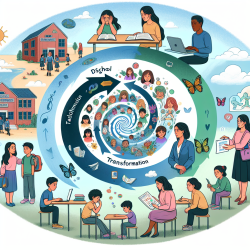The concept of psychological resilience has become increasingly significant in understanding how individuals navigate adversity and maintain well-being across their lifespan. Recent research titled "Measuring Psychological Resilience in Aging: Findings From the Health and Retirement Study and National Longitudinal Study of Adolescent to Adult Health" provides valuable insights into this area. This blog aims to help practitioners enhance their skills by implementing the outcomes of this research or encouraging further exploration.
Understanding Psychological Resilience
Psychological resilience (PR) refers to an individual's capacity to adapt positively in the face of adversity, thereby protecting their health and well-being. The study evaluates two measures of PR: the Simplified Resilience Score (SRS) and the Add Health Resilience Scale (AHRS). These measures were tested for reliability across various social axes such as race/ethnicity, gender, and socioeconomic status.
Key Findings from the Research
- Reliable Measures: Both SRS and AHRS perform well as reliable, one-factor latent constructs capturing adaptive capacity at various life stages.
- Measurement Consistency: The measures showed consistency across social axes, with some differences noted in item measurement across racial/ethnic groups.
- Implications for Practice: Reliable measures of PR enable consistent evaluation of resilience in health and aging processes, which is crucial for planning interventions.
Applying Research Outcomes in Practice
Practitioners can leverage these findings to enhance their interventions and support strategies. Here are some ways to apply the research outcomes:
- Tailored Interventions: Use the reliable PR measures to tailor interventions based on individual needs and social contexts. This can help address specific stressors or adversities faced by different groups.
- Diverse Populations: Understanding resources that support resilience in diverse groups can inform policies that maximize adaptability to hardships in older adulthood.
- Continuous Learning: Encourage further research into PR to stay updated on emerging trends and methodologies that can improve practice outcomes.
The Importance of Further Research
The study highlights the need for continuous exploration into psychological resilience, especially considering its role in addressing health-related inequities that often amplify with age. Practitioners are encouraged to delve deeper into how PR is shaped by different experiences, social locations, and identities.
This ongoing research can provide new insights into how best to support individuals through tailored interventions that consider both shared and group-specific aspects of PR.
Conclusion
The research on psychological resilience offers valuable tools for practitioners aiming to enhance their skills and improve outcomes for diverse populations. By utilizing reliable measures like SRS and AHRS, practitioners can better understand resilience processes and tailor their interventions accordingly.
To read the original research paper, please follow this link: Measuring Psychological Resilience in Aging: Findings From the Health and Retirement Study and National Longitudinal Study of Adolescent to Adult Health.










